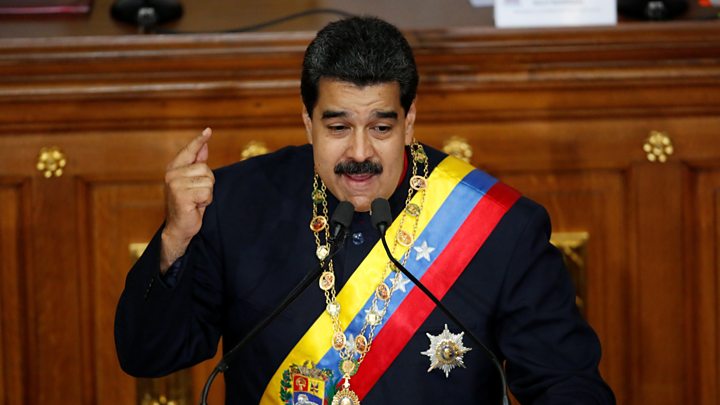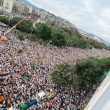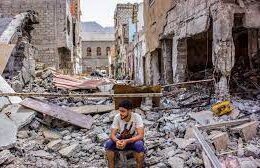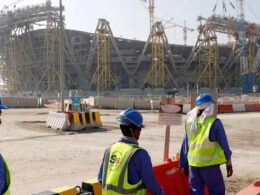By Tony Saunois (Secretary of the Committee for a Workers International (CWI), the international socialist organisation to which the Socialist Party in Ireland is affiliated)
An international campaign by capitalist politicians and media has been unleashed against president Nicolás Maduro’s Venezuelan government. It has been used by Labour’s Blairista right wing to try to weaken Jeremy Corbyn. In Spain, the spectre of Venezuela has been held up as a warning of what a Podemos-led government would mean. The close links of Podemos leader Pablo Iglesias to Hugo Chávez regime in the past has facilitated this idea.
Across Latin America this campaign has been conducted for a longer period of time to try to discredit the idea of socialism, with Venezuela presented as ‘another socialist failure’. Accept our medicine (austerity and cuts) or you will get an epic crisis of Venezuelan proportions has been the cry of presidents Michel Temer in Brazil and Mauricio Macri in Argentina. Others, like Donald Trump in the USA and Theresa May in Britain, have added the charge of ‘dictatorship’ and ‘brutal repression’ against the Maduro government. Trump even threatened military intervention. The was actually used by Maduro to bolster his support, although the threat was rapidly buried by more farsighted leaders of US imperialism.
Such charges from the mouths of the political representatives of the ruling 1% are dripping in hypocrisy. How many military coups have been carried out in Latin America with the active participation of US imperialism resulting in the slaughter of tens of thousands and more viciously tortured? Who but Margaret Thatcher was a friend and supporter of Chilean dictator General Augusto Pinochet, later freed from custody in Britain by Blairista home secretary Jack Straw?
The cry of dictatorship by leaders of Venezuela’s right-wing opposition Mesa de la Unidad Democrática (MUD – Democratic Unity Roundtable) has no greater credibility either. They were involved in the failed military coup against Chávez in 2002 which aimed to install a repressive neoliberal military dictatorship. The hypocrisy of the representatives of capitalism knows no bounds. Socialists and working-class people internationally can have no truck with such reactionary forces which have no intention of defending the democratic rights or the social and political interests of Venezuelan working people.
Nonetheless, socialists need to draw a balance sheet of the current devastating crisis in Venezuela in order to draw crucial lessons and to answer the propaganda of the defenders of capitalism. They hope that their claim that socialism has failed will have the same effect as the collapse of the Stalinist regimes – bureaucratic dictatorial regimes based on nationalised planned economies – 1989-92. However, the situation is entirely different. Then, the capitalist world economy was growing. Today, there is a global crisis and the working class has experienced harsh neoliberal policies and austerity. Even so, the capitalist propaganda will have a certain effect, especially in Latin America and some other countries. It is also necessary to learn from the defeat unfolding in Venezuela as such a threat will confront a Corbyn-led government in Britain or an Iglesias-led government in Spain.
The limits of the Bolivarian revolution
There is a catastrophic economic, social and political crisis in Venezuela. This has developed not because of a failure of socialism but as a consequence of the failure to break conclusively with capitalism and introduce a democratic, socialist, planned economy. That would need to be linked up with the working class in other Latin American countries to establish a voluntary socialist federation which could act as a counterweight to imperialism. The tragedy of the current situation is that the opportunity to break with capitalism did exist in Venezuela and some other Latin American countries, especially Bolivia and Ecuador. The opportunity was lost.
The crisis has allowed the counter-revolution to advance. It has also resulted in a rolling back of the reforms introduced by Hugo Chávez especially after 2002. Chávez swept to power in 1998 promising a ‘Bolivarian revolution’. What this meant was unclear but he threatened to take measures against the ruling class and introduce some significant although limited reforms to bring about more ‘social justice and equality’. Even this provoked the wrath of the ruling class and US imperialism. In events reminiscent of Chile in 1973, a military coup was attempted in 2002. This collapsed as the result of a spontaneous mass mobilisation. Millions poured onto the streets to defend Chávez and oppose the coup by the rich elite. The army split with decisive sections coming over to support Chávez.
At that stage, it would have been possible to take measures to break with capitalism in a relatively peaceful manner. The reactionary right wing was defeated, demoralised and disoriented. However, Chávez refused to take that path. He called for ‘national reconciliation’ while also using more radical terminology. He negotiated with the ruling class, which allowed it to regain the initiative and organise the bosses ‘lockout’ in December 2002. This had the main objective of paralysing production especially in the petrol sector, suffocating the economy and defeating the government. This new attempt at a coup was also defeated by the action of a section of the politically advanced workers – the same layers who had defeated the coup in April.
The defeat of the counter revolutionary imperialist offensive in 2002, together with an upturn in the class struggle in other Latin American countries and the explosion in Argentina (Argentinazo 2001), the mobilisation of the masses against NAFTA (2003) and the insurrection in Bolivia (2003-05) provoked a massive radicalisation of the Venezuelan masses. The most advanced illustration was expressed in the election campaign for the recall election of the president in 2004. This included an open questioning of the bureaucracy and the election in many areas by rank-and-file assemblies of alternative campaign committees to those presented by the regime. Chávez reflected this mass pressure towards the left, speaking for the first time of a ‘revolution within a revolution’. He then – without carrying it to a conclusion – declared that the ‘revolution’ would be socialist.
Under the pressure of the movement and against the hostility of imperialism and the Venezuelan oligarchs, Chávez established the so-called ‘Misiones’. These were very positive in the area of health and public education, opening these areas up to millions for the first time. These and other economic measures at this time resulted in an increase in living standards for the workers and especially the most oppressed. Enthused by these developments workers demanded nationalisation and workers’ control and at the same time occupied some important companies.
Chávez announced the nationalisation of some companies although, in the main, these were undertaken by buying shares in these companies. However, there was never a serious plan to extend the nationalisations to the decisive sectors of the economy. Even in those companies where it was accepted that the workers would elect Juntas Directivas (management councils), genuine workers’ control was never allowed and government functionaries ended up running the companies. Many of these resulted in production being paralysed and they adopted capitalist, anti-worker policies similar to those adopted in the private sector. Other cases saw a partial nationalisation creating ‘mixed companies’ where the state took part ownership.
The Chávez-led government at this stage adopted a policy of radical, left reformism combined with some revolutionary rhetoric. This terrified and enraged the ruling class and imperialism which correctly feared that the revolutionary process and mass movement would drive Chávez even further to the left and threaten the existence of capitalism itself.
The radical reforms where immensely popular, and the Committee for a Workers’ International (CWI) supported them. We also argued that to sustain and develop them a programme to break with capitalism and introduce a socialist planned economy based on nationalisation and democratic workers’ control and management, was necessary. The reforms under Chávez were financed by the boom in the price of oil. Unless capitalism was overthrown, a fall in the oil price would have devastating consequences for the reform package and the social and economic situation.
The CWI warned of this threat early on. In an article, Venezuela: The Revolution in Danger (Socialism Today No.115, February 2008), we pointed to important lessons from history: “While the reform programme has been financed largely through the rising price of oil, this can change with the onset of a crisis in the world economy. This can trigger a fall in oil revenue and result in the rolling back of the reforms. Between 1974-79, the left-of-centre nationalist, populist regime of Carlos Andrés Perez introduced some significant social reforms which were paid for by rising oil prices. By 1979, oil had reached US$80 per barrel. Yet these reforms were wiped out in the 1980s as a major economic crisis hit Venezuela following a crash in oil prices to US$38 per barrel.Those living below the poverty line rocketed from 17% in 1980 to 65% in 1996. This is a warning to Chávez and the working class if capitalism is not replaced by a democratically planned socialist economy”.
The advance of the counter-revolution
Unfortunately, this warning has been fulfilled in the most brutal and rapid form. The economic crisis, combined with sabotage by the ruling elite, the corrosive effects of a massive corrupt state bureaucracy, and the absence of real democratic workers’ control, have resulted in collapse and paralysis. Little remains of the reforms introduced by the Chávez government. Venezuela is now in the midst of what some economists dub the worst economic crisis in its history. Inflation has soared to over 500% and unemployment hovers officially around 20%. Shortages of medical supplies, food and every other item pervade the economy. This has resulted in hunger and an explosion of illnesses arising from dietary deficiency.
Alongside the economic disaster there is a social catastrophe. The failure of the Chavista movement to solve Venezuela’s notorious crime and violence has plunged to new depths. In 2016, there were 28,479 violent deaths, a murder rate of 91.8 per 100,000 residents! This makes Venezuela the second most violent country outside an open warzone, only surpassed by El Salvador. There is now an element of a ‘failed state’ such is the degree of social disintegration.
Against this background the pro-capitalist opposition MUD has made some important advances. In the 2015 elections to the national assembly it won a majority for the first time. Its vote increased to 7,700,000 – up by 2,400,000 compared to the 2010 elections. The Partido Socialista Unido de Venezuela (PSUV – set up by Chávez) and its allies won 5,622,844 votes. This represented an advance for the counter-revolution. The frustration, anger and demoralisation at the economic and social situation were reflected in this changed balance in electoral support. Chávez had won the previous election with more than 60% of the vote on an 80% turnout. A week after the national assembly elections, Maduro announced that he was going to call another election, to a new body, the communal assembly. That was the backdrop to the constituent assembly elections held in July this year. Prior to this, the national assembly had been virtually stripped of its powers.
These upheavals were a product of the failure to break with capitalism. And this impasse has given rise to a series of complications and setbacks for the working class and socialists. The electoral growth of the right wing, especially among the middle class, is a consequence of the failure to advance and sustain the reforms by breaking with capitalism. Chávez initially won significant support from sections of the middle class. This has declined substantially because of a failure to introduce policies and a programme that could appeal to them and defend the interests of the working class and poor. The reformist policies of the Chávez era have been abandoned as the government has swung further and further to the right adopting increasingly repressive and bonapartist and military methods. Maduro has introduced increasingly pro-capitalist and anti-working class measures, trying to appease the traditional right-wing elite and ruling class who are not interested in such an appeasement.
In an attempt to placate the right in the run up to the constituent assembly vote, Maduro tried to strengthen his position by forming an alliance with so-called ‘productive’ or ‘patriotic’ employers. Payment was promptly made on the interest on the foreign debt and money owed to multi-national companies. Spending on food subsidies has been reduced by 76% over the last three years. Job cuts in state enterprises and attacks on workers’ rights were implemented. Special economic zones were created allowing increased exploitation of workers. Natural and mineral resources were opened up to multinationals to plunder.
In Brazil, former president Dilma Rouseff (of the Partido dos Trabalhadores – PT) attempted a similar appeasement policy to try to stave off the parliamentary coup against her. It failed and she was eventually impeached by the ultra-neoliberal Michel Temer, her vice president.
Powerful vested interests
While capitalism has not been broken in Venezuela there has been a change in the makeup of the capitalist class. Although the traditional elite remains – epitomised in the Polar food and drinks conglomerate – a new wing of the capitalist class has emerged over a protracted period, the so-called ‘Boliburguesia’. This phenomenon was pointed out by the CWI in 2009 in an article, Venezuela: A New Phase and Greater Dangers.
Sections of the Boliburguesia literally made a fortune on the back of the revolutionary movement. For instance, Wilmer Ruperti was transformed from being a relatively small businessman into a shipping tycoon and billionaire, at one stage the richest man in Venezuela. He made his fortune during the bosses’ lockout using his tankers to break the ‘strike’ and ship oil for the government. After the lockout he was rewarded with very lucrative government contracts.
This section of the Boliburguesia is totally enmeshed with the Maduro-led government. This process began under the Chávez led governments. It is the inevitable result of trying to maintain a capitalist state and private ownership of decisive sectors of the economy. Here, there is more than echo of what has happened to the African National Congress in South Africa. Following the collapse of the apartheid system a new layer of the upper-middle class and capitalists developed from within the ANC.
The MUD and the traditional sections of the ruling class have attempted to force the downfall of the Chávez and Maduro governments. One of the main obstacles facing the MUD and its backers is that the majority of the military and state machine are also fully incorporated into the Maduro regime. One third of cabinet portfolios are held by serving or retired generals, including the Minister of the Interior, General Néstor Reverol. All government ministers are accountable to the defence minister, General Vladimir Padrino López.
Indeed, the military high command has its own economic interests tied to the regime. This militarisation of the state machine began to develop under Chávez but has become increasingly apparent in recent years. Chávez came from the armed forces and although immensely popular adopted a militaristic approach. In 2016, Maduro issued an executive order establishing the Compania Anómina Militar de Industria, Minera, Petrolifera y Gas, a state-owned oil company run by the military and the ministry of defence.
A consequence of the absence of a powerful, independent and politically conscious mass working-class movement – one of the main weaknesses of the revolutionary process in Venezuela – has been those top-down, administrative methods. With no system of democratic workers’ control, there could be no check, accountability or control. This inevitably allowed corruption and gross inefficiency to thrive. They have now reached a catastrophic level, a rotten impasse.
Contrasting workers’ movement traditions
Even at the height of the revolutionary movement everything centred on Chávez as an individual. Even with the best of intentions, one person cannot carry through the socialist revolution. It requires the active, mass participation of the working class. That the role of Chávez assumed the importance it did reflected a crucial weakness in the history and tradition of the Venezuelan working class. It had never succeeded in building genuine mass independent workers’ parties or organisations, unlike other Latin American countries such as Chile or Brazil.
Chávez was seen as the main figure – almost as a god for some sections who looked to him to resolve all problems. This was not the situation in Chile in 1970-73. Salvador Allende did have mass support and great authority. In addition, however, there was a powerful tradition of mass workers’ parties and independent workers’ organisations: the Socialist and Communist parties, a long history of trade union and other large socialist organisations, like the Movimento de Izquierda Revolucionaria and the Christian left. They all ensured there was a constant struggle for programme and ideas: 1970-73 was understood as a revolutionary process led by the working class. It was not the property or action of one person as it was perceived in Venezuela. Of course, even in Chile the failure of a mass revolutionary party with a clear programme to complete the revolution and break with capitalism led to a bloody defeat for the Chilean workers – something that has not yet faced the Venezuelan workers.
The workers’ movement in Venezuela has had a weaker tradition of independent mass workers’ parties and organisations. The first trade union federation, CTV, was formed in 1936 and control alternated between the capitalist parties, Acción Democrática and COPEI (Social Christian Party). The Venezuelan Communist Party was founded as late as 1931 – under the tutelage of the Stalinists from the start – and worked in illegal conditions until 1941.While it developed a significant influence among sections of the working class it did not develop a mass base like the Communist, Socialist and other left parties in Chile, or in other countries, such as the CP and PT did in Brazil. This weakness of mass independent workers’ parties and tradition was one factor which allowed radical populist figures like Chávez to obtain such a towering presence.
From the top
Even at the peak of the revolutionary upsurge following the failed coup in 2002, the organisations which were formed were partly launched from above and not built through the independent action and struggles of the working class. The new trade union federation, UNETE, was launched in 2003 by the government and was undemocratic from its birth. Although the leadership was never elected by the workers, at its first congress in August 2003 the control of the bureaucracy was extremely weak. This was expressed in the programme it agreed. At a time when nobody was speaking of ‘socialism’, it raised the question of the nationalisation of the banks under workers’ control and a state monopoly of foreign trade. It also raised the need to fight the right wing with its own programme and methods. This programme was never implemented or publicised by the leaders of the FBT (the current directly controlled by the MVR, the party of Chávez prior to the launch of the PSUV) or by those in the leadership who proclaimed themselves to be Trotskyist.
The failure of these layers, despite having a majority, to put forward a programme at the second congress to fight the capitalists and the bureaucracy, and build a united front with the ranks of the Chavista movement was a lost opportunity. This allowed the bureaucracy to break up and fragment the UNETE and paralyse the most advanced layers of the working class at a decisive conjuncture in the revolutionary struggles in Venezuela.
Even the PSUV, which brought in some smaller left-wing groups – founded in 2007 by Chávez’s was in reality launched from above. In the beginning it mobilised hundreds of thousands of people and some of the leaders were removed because they were identified with the bureaucracy. Nonetheless, the bureaucracy checked and controlled them through its control of state resources. Those removed were reinstated, assisted by Chávez.
These features distorted the revolutionary process even at its height and have now degenerated further. The need for genuine workers’ control and independent mass parties of the working class, including politically conscious activists, is one of the crucial lessons that needs to be drawn from the major setbacks facing the working class in Venezuela. There are important lessons for future governments led by Corbyn or Iglesias from these developments.
Balance of power
Yet, despite the economic and social disaster, the traditional forces of the right have not been able to overthrow Maduro. In part this is because the military, largely to protect its own interests, remains loyal to his regime which they largely control at this stage. Although the right wing gained in the national assembly elections, it has not been able to sustain this momentum and mobilise sufficient forces. This was reflected in the failure of the ‘strike’ it called in July 2017. The mass of workers and poor, although frustrated and angry at the betrayal of the government, have not swung over to support the right. They have no confidence in the gangsters who backed the 2002 coup and who want a return to a pre-Chávez economic and political regime.
In the elections to the constituent assembly in July, the government claims there was a 41.5% turnout and that it won 8,089,320 votes. The MUD and its backers boycotted it. In the middle-class and right-wing controlled areas they unleashed a campaign preventing people from voting. Even taking into account that there was some electoral fraud by the regime, the result indicates that a substantial section of the population is still prepared to back the regime against the threat from the reactionary traditional right-wing MUD and the threats made by Trump.
Another important feature was present, however. Significantly, 54,000 people enlisted as constituent assembly candidates outside of the control of the official bureaucracy – mainly ‘dissident Chavistas’, an embryonic opposition to the government from the left. In the capital Caracas they won 200,000 votes despite the polarised nature of the campaign and the obstacles put in place by the bureaucracy. It is from these forces that a possible new socialist left could emerge in opposition to the traditional right wing and to the corrupt governing bureaucratic caste.
The elections gave the right wing internationally the opportunity to intensify its campaign to overthrow Maduro and attack his regime as undemocratic. The election had been called as a means of dissolving the national assembly which the PSUV had lost control of in 2015. It was significant that, prior to the election, Maduro cancelled elections to local councils and even in the trade unions for fear that ‘dissident Chavistas’ would win. He claimed that the constituent assembly elections were a revolutionary measure to rewrite the constitution. (He also presented them as a means of building ‘national unity’.) Yet, it was not a revolutionary act. It was an attempt to strengthen the bureaucratic regime he heads. The constitution that is being rewritten is Chávez’s, introduced in 1999 as a ‘model revolutionary constitution’!
In Chile, during the revolutionary process of 1970-73, the right wing had control of parliament. This was used at every turn to frustrate Allende’s presidency. Beyond that, there were mass committees elected in the workplaces (cordones industriales), community committees (JAPs), and the popular assemblies that had emerged in cities such as Concepción which they virtually controlled. Delegates to these bodies were elected and subject to recall, and there was intense political debate and struggle between the parties. This was at the height of the revolutionary movement in Chile.
One week before the military coup on 11 September 1973, a mass demonstration took place in the capital Santiago demanding arms to defend Allende, and also to shut down parliament. Under those conditions, where a more democratic alternative existed to the undemocratic capitalist parliament, this demand was correct. However, this is not the situation in Venezuela today. The elections to the constituent assembly were not a step to drive the revolution further forward. It was an attempt by a corrupt bureaucratic caste to try and cling onto power when faced with a threat from an even more degenerate and corrupt section of the ruling class – which has been strengthened by the failures of the Maduro government’s economic and political programme.
Socialist Alternative
In Venezuela, socialists are confronted with an extremely complex situation arising from a failure to complete the socialist revolution and break with capitalism. It has provoked much discussion and debate, including among the revolutionary left. There can be no question of socialists supporting the capitalist reactionary opposition led by the MUD with the support of imperialism and international capitalism. At the same time, it is necessary to oppose the policies, programme and methods of the Maduro government.
There are strong echoes of the situation which developed in Brazil when the right wing attempted to impeach Dilma Rouseff, the former PT president, and replace her with an even more right-wing neoliberal reactionary, Michel Temer. The CWI section in Brazil, Liberdade Socialismo e Revolução, and others correctly argued the need to oppose the attempts of the right to impeach Dilma. At the same time, it was necessary to oppose her policies as part of the campaign to build a mass socialist alternative.
To those who argued that there was no difference between Dilma and Temer, the neoliberal hurricane he has introduced since the parliamentary coup is a clear riposte. In Venezuela, this element is also present, but in an even more acute form economically, politically and socially. Only an independent movement of the working class can struggle for an alternative to the right-wing capitalists and the governing bureaucratic caste.
However, some on Brazil’s revolutionary left, like a majority of the Partido Socialista dos Trabalhadores Unificado (PSTU), put forward the slogan “Fuera todos” – “Out with them all” and initially supported the impeachment and then called for an abstention. They wrongly saw the impeachment of Dilma as a victory for the working class. Yet Temer’s victory only opened the way to an even more corrupt, right-wing capitalist neo-liberal government. They are repeating this same mistake in Venezuela by demanding ‘Maduro out’. At this stage, that can only mean replacing Maduro with a government headed by the reactionary MUD coalition. The crucial task is to draw together workers and socialists, especially from the dissident Chavistas who wish to struggle to defend the reforms of the past. The aim must be to defeat the reactionary right-wing and capitalism, the bureaucracy and Boliburguesia, and to build a party and movement with a programme to achieve the socialist revolution.
The crisis in Venezuela is not a failure of socialism but a crisis of the failure to introduce a full socialist programme. It is a warning to a future Corbyn-led or Podemos-led government of the consequences of attempting to introduce reforms without also taking the necessary steps to break with capitalism. In that respect, Venezuela is a tragically lost opportunity. Had capitalism been defeated and a democratically planned socialist system introduced in Venezuela, Bolivia and Ecuador – where there were concurrent revolutionary struggles headed by Evo Morales and Rafael Correa respectively – together with Cuba, a socialist federation of these countries could have been established. This would have had an impact in the US especially given the emergence of the Occupy movement, as the mass movement in support of Bernie Sanders that developed later has shown.
This would have allowed time for the workers’ movement in other countries to prepare the ground to take similar measures. It could have formed an initial counterweight to imperialism and capitalism. Beyond Latin America, such a federation could have forged links with the Greek and Spanish workers – had Alexis Tsipras and his Syriza-led government stood firm and not capitulated to the EU – and a socialist alternative to imperialism and capitalism could have begun to emerge. That opportunity was lost. It is crucial that the lessons are drawn in order to combat the propaganda of capitalist commentators and their supporters, and to prepare for future struggles and opportunities.












